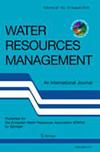Rainwater and Greywater as Alternative Water Resources: Public Perception and Acceptability. Case Study in Twelve Countries in the World
IF 4.7
3区 环境科学与生态学
Q1 ENGINEERING, CIVIL
引用次数: 0
Abstract
Abstract The aim of the paper was to identify factors that influence the public perception of the possibility of replacing tap water with rainwater or greywater. In order to check whether a geographical location and water resources of a region affect the public's attitude toward alternative water systems, the surveys were carried out among respondents from twelve countries. The surveys identified the level of awareness among respondents about their country's water resources, ways to save water at home, and their attitudes to rainwater and greywater as additional sources of water in a building. The results showed that only 39% of respondents would not be afraid to use treated greywater in their household. The situation was better in case of replacement of tap water with rainwater, where more than 54% of the respondents were not concerned. The use of alternative sources of water for body washing and cleaning works was the biggest concern among the respondents. In case of greywater recycling, this was indicated by 56% (personal hygiene) and 34% (cleaning works) of respondents. People in the countries with low water resources view alternative water sources more favourably. They are also more aware of, and more likely to accept the use of rainwater or greywater even in uses where they will come into contact with the human body. The research also showed that for more than 3/4 of respondents, funding to install these systems would encourage their use in their household.雨水和灰水作为替代水资源:公众认知和可接受性。世界上12个国家的案例研究
摘要本文的目的是确定影响公众对用雨水或污水代替自来水的可能性的看法的因素。为了检查一个地区的地理位置和水资源是否会影响公众对替代水系统的态度,调查在来自12个国家的受访者中进行。这些调查确定了受访者对其国家水资源的认识水平、在家中节约用水的方法,以及他们对雨水和污水作为建筑物额外水源的态度。结果显示,只有39%的受访者不害怕在家中使用处理过的灰水。以雨水代替自来水的情况较好,超过54%的受访者表示不担心。受访者最关注的是使用替代水源进行身体清洗和清洁工作。在回用中水的情况下,56%(个人卫生)和34%(清洁工程)的受访者表示这一点。在水资源匮乏的国家,人们对替代水源的看法更为积极。他们也更了解,更愿意接受雨水或污水的使用,即使在使用中他们会接触到人体。研究还表明,超过四分之三的受访者表示,为安装这些系统提供资金将鼓励他们在家中使用这些系统。
本文章由计算机程序翻译,如有差异,请以英文原文为准。
求助全文
约1分钟内获得全文
求助全文
来源期刊

Water Resources Management
环境科学-工程:土木
CiteScore
7.40
自引率
16.30%
发文量
332
审稿时长
9 months
期刊介绍:
Water Resources Management is an international, multidisciplinary forum for the publication of original contributions and the exchange of knowledge and experience on the management of water resources. In particular, the journal publishes contributions on water resources assessment, development, conservation and control, emphasizing policies and strategies. Contributions examine planning and design of water resource systems, and
operation, maintenance and administration of water resource systems.
Coverage extends to these closely related topics: water demand and consumption; applied surface and groundwater hydrology; water management techniques; simulation and modelling of water resource systems; forecasting and control of quantity and quality of water; economic and social aspects of water use; legislation and water resources protection.
Water Resources Management is supported scientifically by the European Water Resources Association, a scientific and technical nonprofit-making European association.
 求助内容:
求助内容: 应助结果提醒方式:
应助结果提醒方式:


